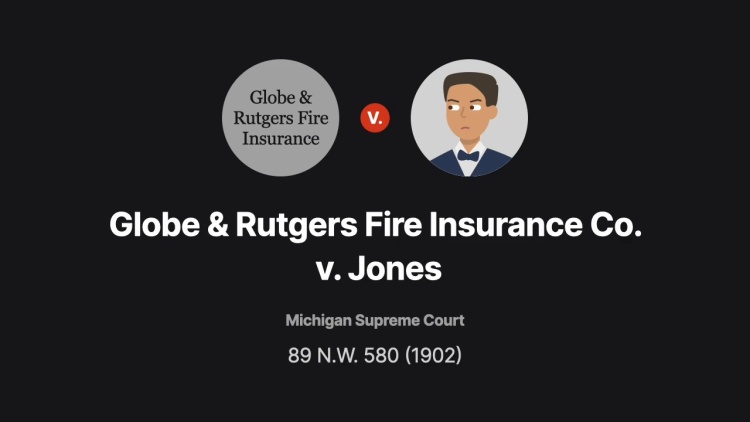Globe & Rutgers Fire-Insurance Co. v. Jones
Michigan Court of Appeals
89 N.W. 580 (1902)
- Written by Lauren Petersen, JD
Facts
James Jones (defendant) was the Detroit agent for the Rutgers Fire-Insurance Company (Rutgers). On March 1, 1898, Jones signed a five-year contract to act as Rutgers’s general agent for the state of Michigan. Under his contract, Jones had a monthly obligation to give account statements and forward any balances to Rutgers. On December 20, 1898, Rutgers merged with the Globe Fire-Insurance Company (Globe) to form Globe & Rutgers Fire-Insurance Company (Globe & Rutgers) (plaintiff). Jones heard rumors of the merger in September and October of 1898, and in March 1899 learned that the merger had transpired. Jones ceased forwarding balances to Rutgers in October 1898. In May 1899, Globe & Rutgers offered Jones a job as general agent. Jones turned down the job. Globe & Rutgers sued Jones for the balances that he had failed to send plus interest, totaling $1,106. At trial, Globe & Rutgers argued that the employment contract between Jones and Rutgers remained binding on Jones even after Rutgers merged with Globe. Jones testified that Globe’s management had a poor reputation, and for this reason Jones did not wish to work for Globe & Rutgers. The trial court found in favor of Jones, holding that Rutgers’s merger with Globe constituted a breach of its employment contract with Jones. Globe & Rutgers appealed.
Rule of Law
Issue
Holding and Reasoning (Moore, J.)
What to do next…
Here's why 911,000 law students have relied on our case briefs:
- Written by law professors and practitioners, not other law students. 47,100 briefs, keyed to 997 casebooks. Top-notch customer support.
- The right amount of information, includes the facts, issues, rule of law, holding and reasoning, and any concurrences and dissents.
- Access in your classes, works on your mobile and tablet. Massive library of related video lessons and high quality multiple-choice questions.
- Easy to use, uniform format for every case brief. Written in plain English, not in legalese. Our briefs summarize and simplify; they don’t just repeat the court’s language.





